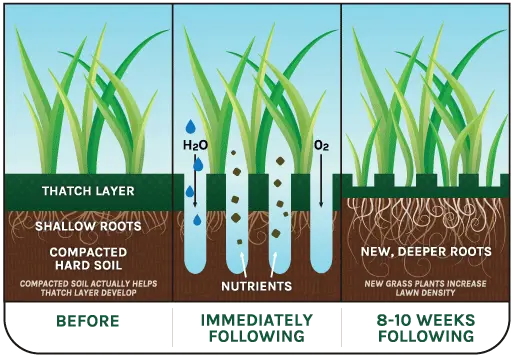
Core aeration is a type of lawn aeration whereby a machine (a lawn aerator) with hollow tines mechanically removes plugs or "cores" of soil and thatch from a lawn. Core aeration reduces soil compaction, creating a channel through which oxygen, water and nutrients can penetrate into the soil.
WHAT ARE THE BENEFITS OF AERATION?
Core aeration can help make your lawn healthier and reduce its maintenance requirements through these means:
- Improved air exchange between the soil and atmosphere.
- Enhanced soil water uptake.
- Improved fertilizer uptake and use.
- Reduced water runoff and puddling.
- Stronger turfgrass roots.
- Reduced soil compaction.
- Enhanced heat and drought stress tolerance.
- Improved resiliency and cushioning.
- Enhanced thatch breakdown.
WHY IS AERATION NECESSARY?
Compact soil prevents grass from establishing a healthy root system and keeps water and fertilizer from reaching the roots.
In most home lawns, fertile topsoil may have been removed or buried during excavation of the basement or footings, forcing grass to grow in subsoil that is more compact, higher in clay content and less likely to sustain a healthy lawn.
Walking, playing and mowing will compact soil and stress lawns. Raindrops and irrigation further compact the soil, reducing large air spaces where roots readily grow. Compaction is greater on heavy clay soils than on sandy soils, and it is greatest in the upper 1 to 1 1/2 inches of soil.
Aeration can help relieve soil compaction, allowing your grass to grow deeper roots and make better use of water and fertilizer.



Comments (1)
Joe